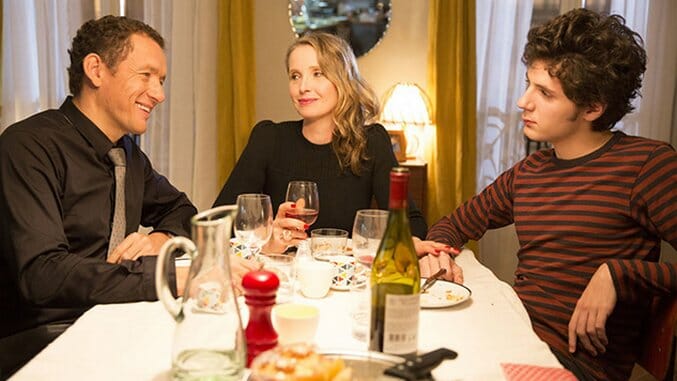Lolo

Ever eaten a Wispa, that aerated chocolate confection of British design? No? Well, sit down for Julie Delpy’s Lolo and you’ll get more or less the right idea: sweet and breezy, light to the palette, and yet dotted with quiet high notes that exponentially alter your sensations for the better as you consume it. Lolo, like a tasty candy bar, does not require any heavy lifting to enjoy—though it is subversive in its own way. If the film came from anywhere but France, and perhaps anyone but Delpy, a single glimpse at a poster or at the trailer would set expectations in stone, and in stone they would remain. From the outside, it looks an awful lot like any other inoffensive romantic comedy. Hell, that’s what it looks like from the inside, too.
But looks are often deceiving, so goes the bromide. Just take Lolo’s title character, played by Vincent Lacoste, who first strikes an impression through his unassuming and angelic good looks. Eloi, Lolo to his mother Violette (Delpy), cuts a lamb-y figure, but beneath his harmless veneer lies the soul of an imp. Violette, a fashion industry workaholic returned home from a much-needed spa retreat in Biarritz, has recently found herself a new beau, Jean-René (Dany Boon), an IT nerd who happens to be moving to Paris for a new job. The relationship comes as much a shock to her as to her bestie, Ariane (Karin Viard), and especially to Eloi. Look closely when Violette introduces the two men in her life to one another. If you’ve got a good eye, you can see the gears begin to turn in Eloi’s jealous lizard brain.
Eloi, we quickly learn, wants Violette’s love all to himself, and he will stop at literally nothing short of straight-up murder to send poor, unsuspecting Jean-René packing. No man is good enough for Eloi’s “mommykins,” a nickname he uses for Violette that would be adorable coming from a tyke but sounds downright creepy issuing from the mouth of a nineteen-year-old. His ploy to unburden Violette of Jean-René starts with itching powder, escalates to tranquilizers in champagne, and, well, you’ll have to see the film yourself to see just how crazy Eloi really is. That craziness extends to Delpy by virtue of authorship: Here, she directs and also co-writes with Eugénie Grandval. It takes a certain kind of person to drive their mother’s would-be suitors insane, yes, but it takes a certain kind of mind to will that person into being.
The trick to Lolo is nestled within its sense of tone and craft. Even as Eloi’s assassination attempts on Jean-René’s courtship of Violette grow increasingly jaw-dropping, the film stages them with a shrug and a wink. In an American rom-com, this would come off as nauseatingly coy. In Lolo, it reads as charming, but that charm belies a certain level of unspoken and decidedly maternal terror: Eloi’s obsession with Jean-René, with Violette, and with himself (surprise—he’s kind of a narcissist!) is unchecked and untreated. Movies of Lolo’s make—2010’s Cyrus comes to mind, as well as Monster in Law, which admittedly approaches romantic sabotage from a different angle—tend to build toward a happy catharsis. Lolo doesn’t exactly not do that, but the film’s happy catharsis comes with a keen and surprising edge. It’s a wonder everyone makes it to the credits alive.